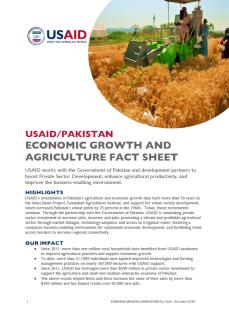The United States Agency for International Development (USAID) is partnering with the private sector of Pakistan to sustainably enhance the country’s trade competitiveness, promote investment, raise agricultural productivity, and improve economic growth for all.
SECTOR BACKGROUND
USAID economic growth and agriculture investments in Pakistan began more than 60 years ago, with the development of the Indus Basin Project, Faisalabad Agricultural Institute, and support for wheat variety creation. These collaborations continue to this day with an evolving focus on leveraging sustainable private sector resources for inclusive development.
SECTOR PRIORITIES
Boosting Private Sector development
USAID helps businesses expand by increasing access to new technologies and improving the management practices of high-value agriculture, industry, and service sectors in dairy, electric vehicles, textiles, digital services, and agribusiness. USAID assistance fosters entrepreneurship and job creation by working with small and medium enterprises (SMEs) to improve their business practices, build trade and investment linkages, inform policy reforms, and increase access to capital. USAID is also partnering with local banks and the U.S. Development Finance Corporation to encourage financing to qualified SMEs to expand lending.
Enhancing Agriculture Productivity
Pakistan’s agriculture sector employs more than 40 percent of the nation’s workforce and is a key driver of the country’s economic growth. USAID has been working with Pakistan to boost agricultural productivity by developing new crop varieties, improving management practices, and increasing farmers’ access to improved technologies and irrigation water. To further increase farmers’ and agribusinesses’ incomes, USAID helps agricultural entrepreneurs access financing, add value to agricultural commodities and produce, and link them to more lucrative markets.
Improving Business enabling environment
USAID supports economic policy reforms that make doing business easier for Pakistani companies. One reform improves regulatory procedures for the licensing and operations of a warehouse receipts system for selected agricultural goods. This improvement has enabled farmers to access financing and improve post-harvest storage. USAID also helps the Pakistani Government modernize trade systems and adopt global trade norms, including duty rationalization, process streamlining, and trade agreement implementation. The Pakistani Government accesses and reduces compliance costs to conduct international trade by taking these steps. USAID also assists Pakistani federal and provincial policy makers revise investment and SME policy frameworks. Updating these frameworks will increase investment and empower entrepreneurs to start new businesses.
Investment Promotion
USAID builds the capacity of Pakistani institutions focused on investment promotion, improves the ecosystem of foreign direct investment (FDI), and increases United States-Pakistan bilateral trade. USAID also helps to remove barriers to investment and bilateral trade by facilitating Pakistani-led improvements in government regulations and improving the overall investment climate.
KEY RESULTS
- More than one million rural households have benefited from USAID investments in improving agricultural practices and supporting economic growth.
- More than $563 million in private sector investments have supported agriculture and SMEs
- Farms and firms increased the value of their sales by over $1.47 billion and over 101,000 new jobs created.
- 391,470 hectares included under improved technologies or management practices.
- Over 101,000 full-time equivalent jobs were created.

Current/Ongoing Activities
Pakistan Agriculture Programs – II
Gomal Zam Dam Command And Development Project
Water Management For Enhanced Productivity
Investment Promotion Activity
Pakistan Regional Economic Integration Activity
Commercial Law Development Program In Pakistan
Pakistan Private Investment Initiative – Indus Basin Holding

